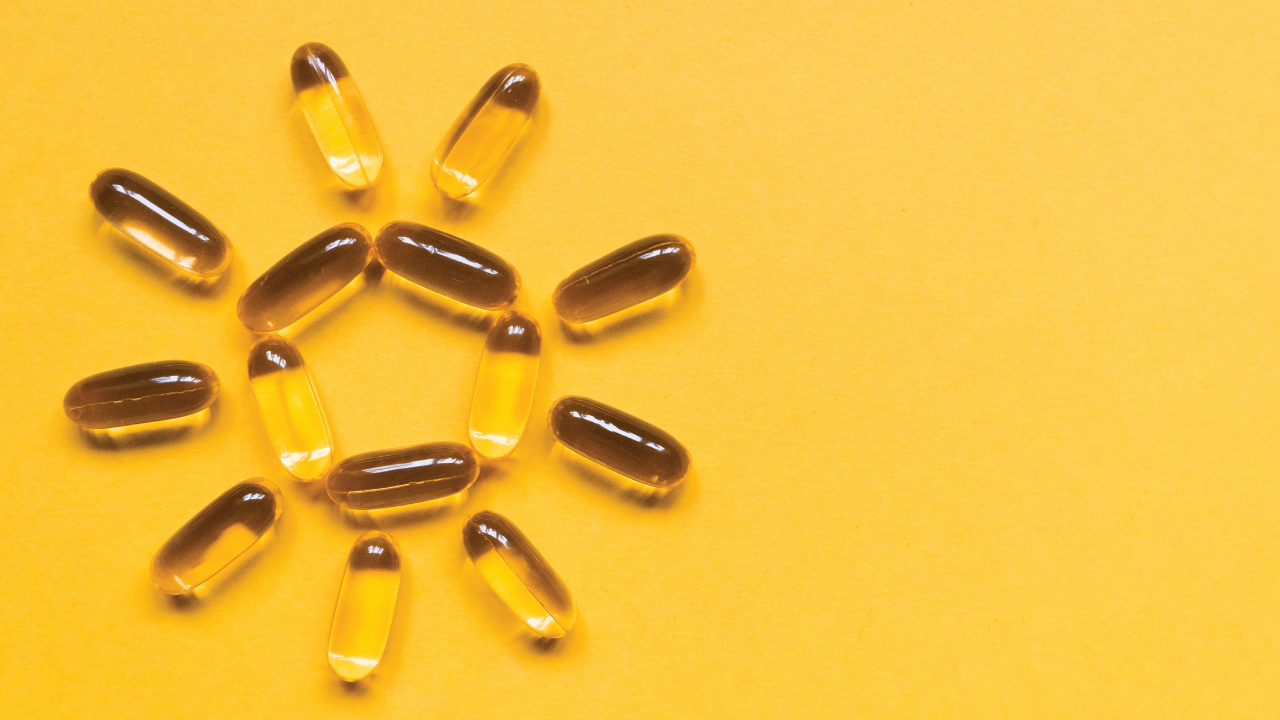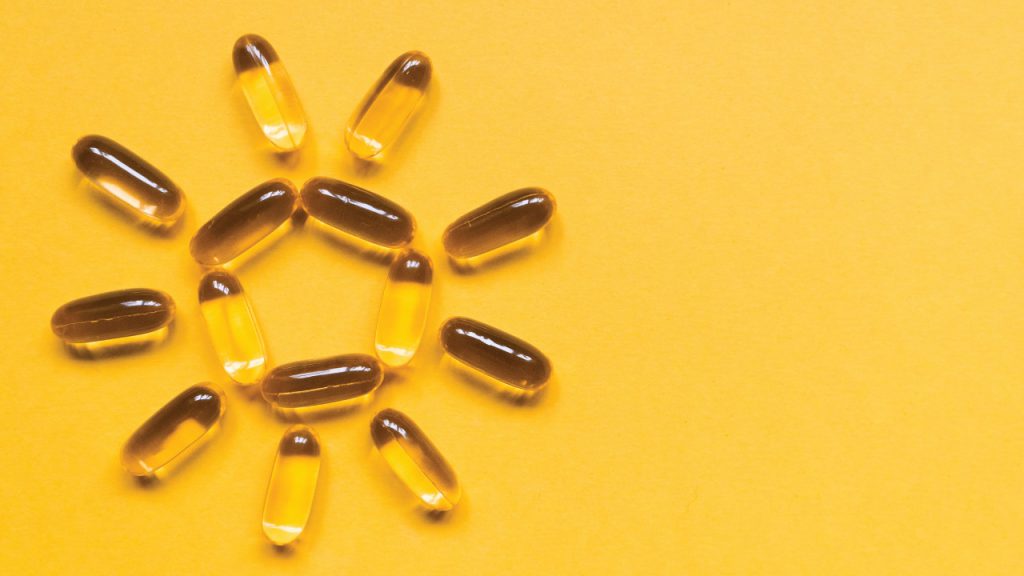
9 Reasons Why Vitamin D Is So Important
June 3, 2025
Vitamin D is important year-round, but why is Vitamin D, the “sunshine” vitamin, so important? Here are the details.
In this Healthy Insight:
- What is Vitamin D?
- Why Do I Need Vitamin D?
- Low Vitamin D Symptoms
- Causes of Vitamin D Deficiency
- Too Much Vitamin D
- Vitamin D and Your Immune System
- Vitamin D Benefits
- Vitamin D Supplements
- What’s the Difference Between Vitamin D2 and D3?
- How Much Vitamin D Should I Take?

What Is Vitamin D?
Vitamin D is part of a group of fat-soluble vitamins. It’s produced when your skin’s exposed to the sun. When it comes to nutritional supplements, you’ll want to look for D3, which is the same type of D (cholecalciferol) formed by sunshine. Salmon, eggs and certain mushrooms deliver the potent form of Vitamin D and some everyday foods like orange juice, milk and cereal are fortified with Vitamin D, but it’s still difficult to supply all you need from diet alone.
1. Why Do I Need Vitamin D?
With the increased use of sunscreen and more time spent indoors, levels of Vitamin D have significantly decreased. In fact, it’s estimated that about 40% of Americans may be deficient. Individuals living in northern climates where there’s less sunshine, those with darker skin tones, and the elderly may especially be at risk.

2. Low Vitamin D Symptoms
Some symptoms of a deficit in Vitamin D include: fatigue, thinning or brittle bones, muscle weakness, frequent illness, sadness, moodiness, hair loss, anxiety or depression.
3. Causes of Vitamin D Deficiency
Sunscreen use. – For decades we’ve been slathering on sunscreen with the highest SPF we can find. While it’s important to protect our skin from damaging rays, some sun exposure – usually 10-30 minutes a day several times a week – is necessary to keep Vitamin D levels healthy. If you live in northern climates where you have fewer sunny days or are dark-skinned, elderly or overweight, your ability to produce Vitamin D is further reduced.

Staying indoors too much. – Nicknamed the “sunshine vitamin,” Vitamin D is primarily obtained through sun exposure. Since most of us spend a lot of time indoors, it’s no wonder we’re lacking D.
Insufficient consumption of fish and dairy. – Foods that contain high amounts of Vitamin D like salmon, liver, tuna, sardines and egg yolks are often missing from the modern diet. Even though milk, orange juice and cereal are fortified with Vitamin D, you’d need to consume huge amounts and they may cause other unwanted health issues.
Inability to absorb dietary fat. – Since Vitamin D is a fat-soluble vitamin, you need to have the ability to absorb it. Some health conditions that affect your digestive tract and certain medications will inhibit absorption.
4. Too Much Vitamin D
Although rare, too much Vitamin D can be very serious and is usually a result of megadoses of the vitamin rather than overexposure of the sun or consuming too much via foods. When toxicity happens, calcium buildup in your blood is the main concern. This causes nausea and can possibly lead to calcium-based stones.
5. Vitamin D and Your Immune System

Vitamin D receptors are found in your immune cells. Recent research suggests Vitamin D may boost the natural immune function and help ensure the immune system stays balanced. Low levels of Vitamin D have been associated with increased risk of respiratory issues, lung function and overall susceptibility to immune-related issues.
6. Vitamin D Benefits
Almost every cell and tissue in your body includes receptors for Vitamin D. That’s how important it is, especially for bone health because it helps your body absorb and efficiently use calcium. But research shows that the benefits of Vitamin D go beyond bone support as it also…
- Helps maintain a strong immune system
- Supports a healthy nervous system
- Contributes to efficient cellular activity including the cells in the breast and colon
- Fosters a positive mood and strong cognitive function
- Encourages strong, healthy muscles
- Supports a healthy cardiovascular system (heart & blood pressure)
- Plays a role in kidney function
- Promotes mood
- Fosters a healthy respiratory function
7. Vitamin D Supplements
Because it’s so difficult to consume enough Vitamin D, and sun exposure may not be an option, many people choose to supplement with Vitamin D. D comes in two forms: D2, which is plant-derived and often found in fortified foods and D3, naturally produced by our bodies.
Too much of a good thing could be bad, so it’s important to talk to your doctor. A simple test can indicate any deficiencies, and he/she can make a proper recommendation on how much you need.

8. What’s the Difference Between Vitamin D2 and D3?
Vitamin D2 (also known as Vitamin D)
- Known as ergocalciferol
- The human body does not make Vitamin D2.
- Derived from plant and fungal source, making it a good choice for vegetarians.
- Produced by irradiating fungus/yeast with ultraviolet light.
- The first synthetic form of Vitamin D produced in the early 1920s.
- Used to fortify foods like dairy, juices and cereals.
- May be more sensitive to fluctuations in temperature and humidity.
- Shorter shelf life.
Vitamin D3
- Known as cholecalciferol.
- The human body makes Vitamin D3 from sunshine and is actually considered a hormone.
- Naturally occurring form made when sunlight hits your skin for 10-15 minutes without sunscreen.
- Derived from animal sources and made in the skin when 7-dehydrocholesterol reacts with UVB ultraviolet light.
- Believed to be more effective at increasing levels of Vitamin D in the blood.
- Is the form most utilized in clinical trials.
- More stable form when exposed to temperature, humidity, and other environmental conditions.
- Longer shelf life.
9. How Much Vitamin D Should I Take?
Most experts recommend anywhere from 400 – 4000 IU. It’s important to work with your health care practitioner, but the range of 800-1000 IU/ day appears to be the most common recommendation.
You’ll protect your bones and a whole lot more when you enjoy the d-lightfully healthy benefits of Vitamin D.


